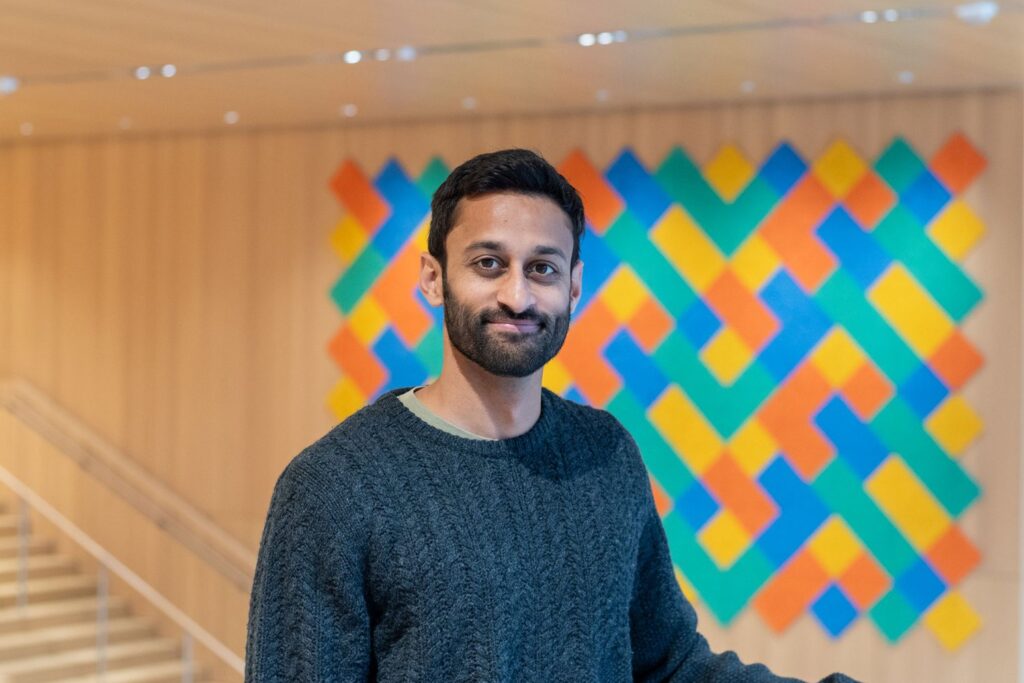Amid the advantages that algorithmic decision-making and synthetic intelligence provide — together with revolutionizing pace, effectivity, and predictive capability in an enormous vary of fields — Manish Raghavan is working to mitigate related dangers, whereas additionally searching for alternatives to use the applied sciences to assist with preexisting social considerations.
“I in the end need my analysis to push in direction of higher options to long-standing societal issues,” says Raghavan, the Drew Houston Profession Improvement Professor who’s a shared college member between the MIT Sloan College of Administration and the MIT Schwarzman Faculty of Computing within the Division of Electrical Engineering and Pc Science, in addition to a principal investigator on the Laboratory for Data and Choice Programs (LIDS).
A great instance of Raghavan’s intention may be present in his exploration of the use AI in hiring.
Raghavan says, “It’s laborious to argue that hiring practices traditionally have been significantly good or value preserving, and instruments that be taught from historic knowledge inherit all the biases and errors that people have made prior to now.”
Right here, nevertheless, Raghavan cites a possible alternative.
“It’s at all times been laborious to measure discrimination,” he says, including, “AI-driven techniques are generally simpler to watch and measure than people, and one aim of my work is to grasp how we would leverage this improved visibility to give you new methods to determine when techniques are behaving badly.”
Rising up within the San Francisco Bay Space with dad and mom who each have pc science levels, Raghavan says he initially wished to be a physician. Simply earlier than beginning faculty, although, his love of math and computing referred to as him to comply with his household instance into pc science. After spending a summer time as an undergraduate doing analysis at Cornell College with Jon Kleinberg, professor of pc science and knowledge science, he determined he wished to earn his PhD there, writing his thesis on “The Societal Impacts of Algorithmic Choice-Making.”
Raghavan gained awards for his work, together with a Nationwide Science Basis Graduate Analysis Fellowships Program award, a Microsoft Analysis PhD Fellowship, and the Cornell College Division of Pc Science PhD Dissertation Award.
In 2022, he joined the MIT college.
Maybe hearkening again to his early curiosity in drugs, Raghavan has completed analysis on whether or not the determinations of a extremely correct algorithmic screening device utilized in triage of sufferers with gastrointestinal bleeding, often called the Glasgow-Blatchford Rating (GBS), are improved with complementary professional doctor recommendation.
“The GBS is roughly nearly as good as people on common, however that doesn’t imply that there aren’t particular person sufferers, or small teams of sufferers, the place the GBS is improper and medical doctors are more likely to be proper,” he says. “Our hope is that we are able to determine these sufferers forward of time in order that medical doctors’ suggestions is especially helpful there.”
Raghavan has additionally labored on how on-line platforms have an effect on their customers, contemplating how social media algorithms observe the content material a consumer chooses after which present them extra of that very same type of content material. The issue, Raghavan says, is that customers could also be selecting what they view in the identical method they may seize bag of potato chips, that are after all scrumptious however not all that nutritious. The expertise could also be satisfying within the second, however it may possibly go away the consumer feeling barely sick.
Raghavan and his colleagues have developed a mannequin of how a consumer with conflicting wishes — for rapid gratification versus a want of longer-term satisfaction — interacts with a platform. The mannequin demonstrates how a platform’s design may be modified to encourage a extra healthful expertise. The mannequin gained the Exemplary Utilized Modeling Monitor Paper Award on the 2022 Affiliation for Computing Equipment Convention on Economics and Computation.
“Lengthy-term satisfaction is in the end necessary, even when all you care about is an organization’s pursuits,” Raghavan says. “If we are able to begin to construct proof that consumer and company pursuits are extra aligned, my hope is that we are able to push for more healthy platforms with no need to resolve conflicts of curiosity between customers and platforms. In fact, that is idealistic. However my sense is that sufficient individuals at these firms imagine there’s room to make everybody happier, and so they simply lack the conceptual and technical instruments to make it occur.”
Relating to his means of arising with concepts for such instruments and ideas for methods to finest apply computational strategies, Raghavan says his finest concepts come to him when he’s been enthusiastic about an issue on and off for a time. He would advise his college students, he says, to comply with his instance of placing a really troublesome drawback away for a day after which coming again to it.
“Issues are sometimes higher the subsequent day,” he says.
When he is not puzzling out an issue or educating, Raghavan can usually be discovered outside on a soccer subject, as a coach of the Harvard Males’s Soccer Membership, a place he cherishes.
“I can’t procrastinate if I do know I’ll need to spend the night on the subject, and it offers me one thing to sit up for on the finish of the day,” he says. “I attempt to have issues in my schedule that appear a minimum of as necessary to me as work to place these challenges and setbacks into context.”
As Raghavan considers methods to apply computational applied sciences to finest serve our world, he says he finds probably the most thrilling factor occurring his subject is the concept AI will open up new insights into “people and human society.”
“I’m hoping,” he says, “that we are able to use it to higher perceive ourselves.”
